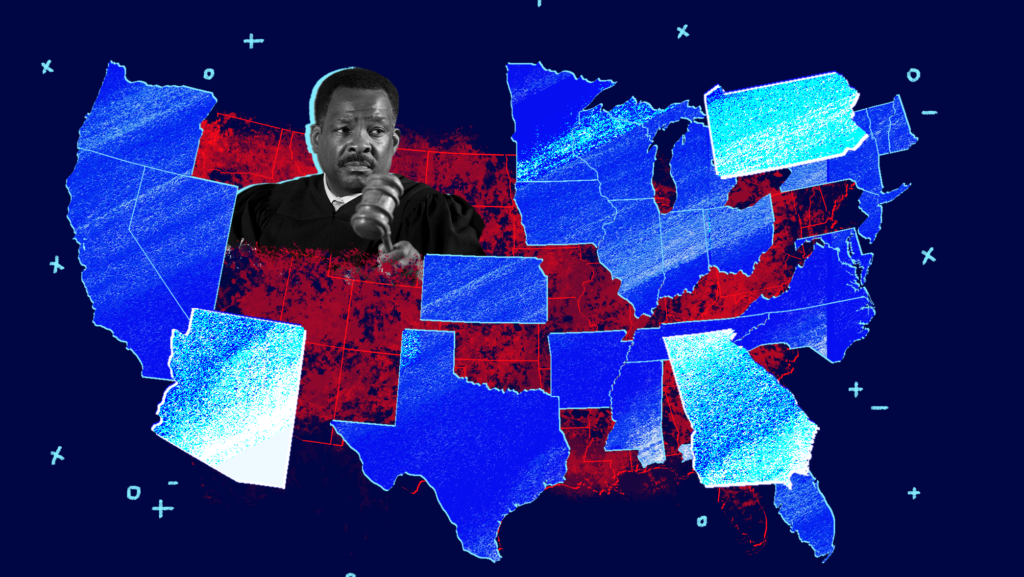Once Again The Courts Protected Democracy

Following their humiliating defeats in 2020 and 2022, Republicans and their conservative allies insisted that they were going to upgrade their anti-voting efforts heading into the presidential election cycle. Instead, a new report from Democracy Docket shows that 2023 was another year in which courts protected citizens’ voting rights and ensured free and fair elections.
Once again, pro-voting groups dominated in every category of court wins. In a year that saw 146 separate court orders across 34 states, pro-democracy forces won more than twice as many times as they lost. This includes winning nearly twice as many final orders and 70% of the interim orders in cases that are still pending. Pro-voting victories spanned state and federal courts at all levels.
The courtroom fights in 2023 focused on the topics we have come to expect:
- Election administration (26)
- Registration (22)
- Mail-in voting (17)
- In-person voting (10)
- Post-election litigation (6)
- Felony disenfranchisement (6)
In a nod to the 2024 battleground map, the states that saw the most court victories were: Arizona (19), Pennsylvania (11) and Georgia (6).
For the third year in a row, the Republican Party increased its share of the anti-voting docket. In 2023, Republicans were behind 68% of all anti-voting lawsuits, up from 52% in 2022 and 25% in 2021. On the other side, it was nonpartisan groups that litigated the vast majority — 92% — of the pro-voting cases in 2023.
While there has been widespread coverage of former President Donald Trump and the Republican Party’s litigation tirade and abysmal court record in 2020, too little attention has been paid to their repeated litigation failures in the intervening years. According to Democracy Docket’s data, Republican and anti-voting forces prevailed a mere 20% in 2022 and 27% of the time in 2023.
One reason for this moderate uptick in GOP wins was the relatively lighter load of post-election cases in 2023. For the last two election cycles, post-election litigation has become a graveyard of near non-stop defeats for Republicans.
Notably, these impressive results do not include either of last year’s two blockbuster Supreme Court victories — Allen v. Milligan and Moore v. Harper. Both cases stemmed from redistricting disputes and the report wisely excludes the 57 active redistricting cases that Democracy Docket is tracking.
Nevertheless, Moore seems to have played a subtle but important role in forum selection in 2023. As I have previously written, in Moore the GOP advanced the fringe independent state legislature (ISL) theory. If successful, it would have gutted the role of state courts in protecting voters from voter suppression and election subversion laws enacted by Republican-controlled legislatures. Initially, many pundits predicted the worst — adoption of this dangerous theory by the conservative U.S. Supreme Court.
Unsurprisingly, in 2022 pro-voting groups filed litigation in federal court over state court by two-to-one. After the Supreme Court rejected the ISL theory last June, the trend reversed itself, with pro-democracy litigants filing slightly more cases in state, rather than federal, court in 2023.
We can expect that many of the trends we have seen over the last year — and three years — will continue in 2024.
First, we should expect to see an uptick in the number of voting and election cases filed and decided by the courts. There was a 19% increase in voting and election cases filed in 2023 versus 2021. If there is a similar uptick in 2024 compared to 2022, we would expect more than 200 new lawsuits filed this year.
Second, it seems clear that the Republican National Committee (RNC) is committed to aggressively leading the coalition of anti-voting groups in court. Despite the rhetoric of some GOP officials, the RNC’s courtroom lawyers continue to vigorously oppose mail-in and early voting at every turn. Though there is a broader constellation of right-wing anti-democracy litigation groups, in 2024 the RNC’s star will again shine brightest in the universe of voter suppression and election subversion.
Third, the trend towards more nonpartisan pro-voting rights litigation seems a safe bet to continue. Already, the nonprofit organizations are shouldering more than 90% of the caseload and that seems likely to continue at least through Election Day 2024.
Finally, the biggest variable for 2024 litigation will again be in the post-election. This has been an area of increased activity ever since Trump and his allies lost 64 cases after the 2020 election. This was followed by a similar, but smaller, losing streak for the GOP following the 2022 election. It seems nearly certain that Republicans at all levels will continue to file frivolous post-election lawsuits and will suffer similar results in 2024.
We began 2023 with trepidation about what the Supreme Court might do to voting rights law. We now know those concerns were for naught. As Democracy Docket’s latest report proves once again, you cannot understand what is happening to democracy if you don’t follow what is happening in court. And, in 2023 that was overwhelmingly good news for voters.